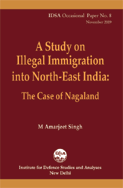A Study on Illegal Immigration into North-East India: The Case of Nagaland
 Migration is a global phenomenon, and will continue to do so in the near future. Every country aspires to regulate migration according to their requirements. But, not all country is successful. Hence illegal (cross-border) immigration has been a cause of concern to them. Efforts to control and prevent illegal immigration remain highly inadequate in India; and likely to remain so in the coming years. But, the reality is that unabated illegal immigration has enormous demographic and social implications, capable of creating tensions and conflict between the immigrants and the natives; and more so among the natives. This is particularly worrisome in North-East India, which has been the victim of unabated illegal immigration from across the border in Bangladesh. Unfortunately, campaign against illegal immigration in India also divides its people on communal lines. Hence, the future tensions and conflict will be not only between the immigrants and the natives, but also among the natives. However, in the absence of a strong political will, illegal immigration would continue despite fully knowing its long term implications. Indeed, India has chosen to ignore illegal immigration for several decades; and it will be extremely difficult for her to resolve the ‘ensuing conflict’ arising out of unabated illegal immigration. If deportations continue at current levels it will take more than 1000 years for India to deport an estimated 15 million illegal immigrants. Hence, India needs to adapt realistic time-bound strategies to control and prevent cross-border illegal immigration. Nonetheless, the issue is much more serious than it seems.
Migration is a global phenomenon, and will continue to do so in the near future. Every country aspires to regulate migration according to their requirements. But, not all country is successful. Hence illegal (cross-border) immigration has been a cause of concern to them. Efforts to control and prevent illegal immigration remain highly inadequate in India; and likely to remain so in the coming years. But, the reality is that unabated illegal immigration has enormous demographic and social implications, capable of creating tensions and conflict between the immigrants and the natives; and more so among the natives. This is particularly worrisome in North-East India, which has been the victim of unabated illegal immigration from across the border in Bangladesh. Unfortunately, campaign against illegal immigration in India also divides its people on communal lines. Hence, the future tensions and conflict will be not only between the immigrants and the natives, but also among the natives. However, in the absence of a strong political will, illegal immigration would continue despite fully knowing its long term implications. Indeed, India has chosen to ignore illegal immigration for several decades; and it will be extremely difficult for her to resolve the ‘ensuing conflict’ arising out of unabated illegal immigration. If deportations continue at current levels it will take more than 1000 years for India to deport an estimated 15 million illegal immigrants. Hence, India needs to adapt realistic time-bound strategies to control and prevent cross-border illegal immigration. Nonetheless, the issue is much more serious than it seems.
Download Occasional Paper
Order Hard Copy
Please email us at publication [at] idsa.in or call +91-11-2671 7983 (Ext. 7321 or 7225)




